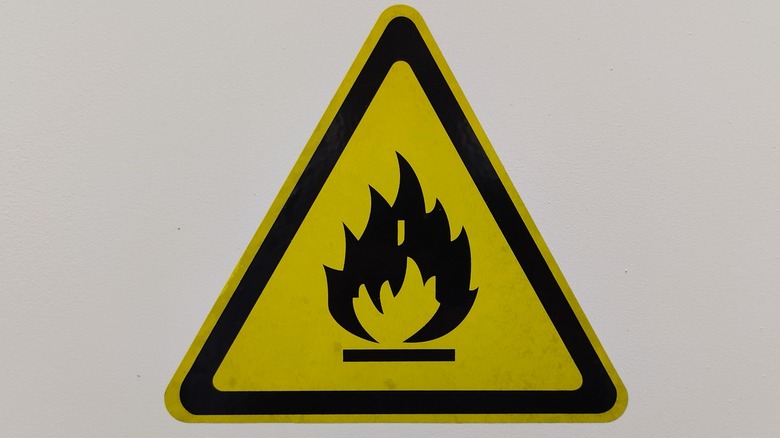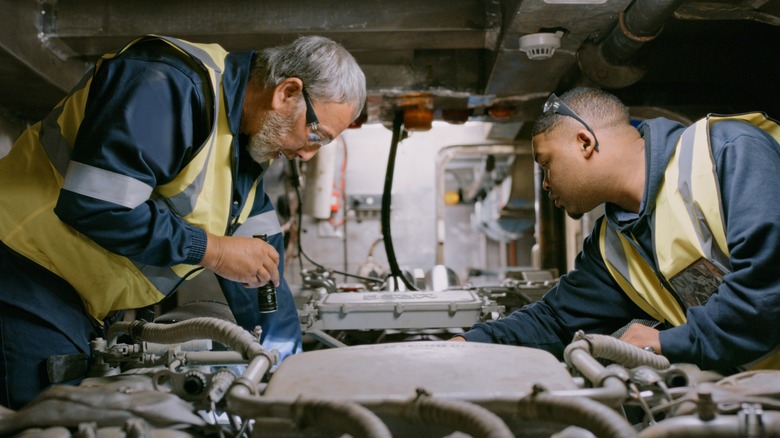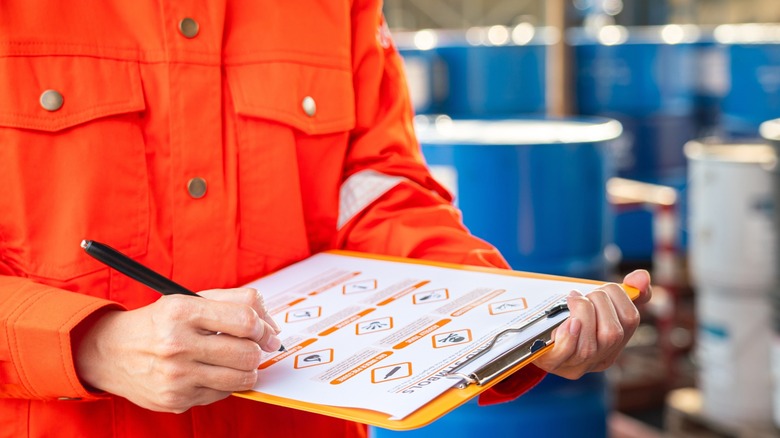Are Diesel Fumes Flammable? Here's What You Need To Know
Fuel, no matter the type, needs to be handled correctly. Because if you're not careful, the slightest mistake could easily trigger an accident. However, while most people are aware of how volatile gasoline is, they may not give as much consideration to the storage requirements of diesel.
This is interesting because diesel powers millions of vehicles around the world, from trucks and buses to construction equipment and ships. While you may know that diesel is efficient and powerful, how much do you know about how safe or volatile it might be? This raises an important question: Are diesel fumes flammable?
This knowledge about diesel is not reserved only for those working directly with the fuel but really is for anyone who might be exposed to it. So, whether you're a professional driver, a mechanic, or someone who handles diesel-powered machinery at work, it's essential you understand how diesel fumes behave and if they pose any safety risk.
Are diesel fumes a fire risk?
Diesel is less volatile than gasoline, meaning it doesn't evaporate as easily and doesn't produce as many flammable vapors at normal temperatures. So, does this mean it's not a fire risk? Well, not exactly. What it really means is that diesel fuel has a higher flash point: the temperature at which it can produce enough vapor to catch fire if there's a spark or flame.
To give you more context, diesel's flash point typically ranges between 125 degrees Fahrenheit and 180 degrees Fahrenheit (about 52 degrees Celsius to 82 degrees Celsius). In contrast, gasoline's flash point is around minus 45 degrees Fahrenheit (minus 43 degrees Celsius).
Diesel fumes can accumulate to dangerous levels in certain environments, especially with poor ventilation. If these fumes are exposed to an open flame or a very hot surface, they can ignite and cause a fire. This is particularly possible in enclosed spaces such as a garage or engine room on a ship, where they store and use diesel.
Gasoline's lower flash point means it can catch fire at a lower temperature if its vapors interact with something as common as a lit cigarette, a small spark, or even static electricity. So, while diesel fumes are less flammable than gasoline fumes, in the right circumstances, diesel fumes can still pose a serious fire hazard.
In what situations could diesel fuel ignite?
If you store or handle diesel in an enclosed space without proper airflow, the fumes can linger and build up over time. In a poorly ventilated garage, for instance, a single spark from a power tool or a stray flame from a welding torch could ignite the accumulated diesel fumes and start a fire.
Naturally, engines and heavy machinery can get really hot when in use, and diesel fuel itself can trigger a fire if it comes in contact with a really hot surface. So, if equipment is not properly maintained and parts wear down, enabling diesel fuel to leak and spill on a really hot surface, like an overheating engine, then there's a high chance of ignition.
Diesel fuel can also ignite without an external source in a process known as spontaneous ignition. This occurs when you store diesel in large quantities in an environment where heat can build up. In a confined space without temperature control, the diesel inside a storage tank can reach a temperature where it combusts on its own.
Moreover, when diesel fumes interact with certain chemicals, like strong oxidizers, they can become more volatile. Diesel can also act strangely where there's combustible dust. That's because combustible dust, when suspended in the air, creates an explosive atmosphere. So, a combination of diesel fumes and excessive combustible dust can be pretty hazardous.
Tips on how to manage diesel fuel safely
Whether you're storing, handling, or using diesel fuel, always implement proper safety measures. First and foremost, store diesel fuel in a well-ventilated area in approved containers specifically designed to handle its properties. Keep these containers in a cool, dry place away from direct sunlight or any source of ignition.
Make sure all equipment used in transferring diesel fuel is properly grounded and bonded to prevent static electricity buildup, which can ignite diesel fumes. You can also consider installing exhaust fans to reduce the risk of vapor buildup in your garage or workshop.
Another thing you should do is regularly inspect and maintain engines, machinery, and storage tanks to prevent leaks or overheating. If you notice the slightest sign of a fuel leak, address it immediately. When you perform routine maintenance checks, you can catch potential issues early and prevent them from escalating into a more serious problem.
Labeling chemicals properly is another important safety measure. A great place to start is using proper signage on containers to indicate the presence of flammable material. Then, store diesel fuel far away from any incompatible chemicals to avoid accidental reactions.
However, remember that emergencies can happen despite all precautions. Have fire extinguishers on hand, and make sure everyone understands how to use them and is familiar with evacuation procedures. Conduct regular drills so that everyone is prepared to respond quickly in an emergency.



